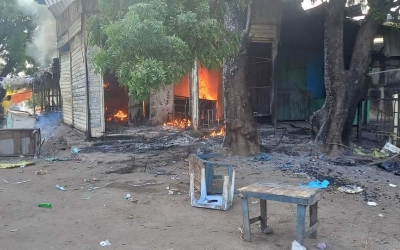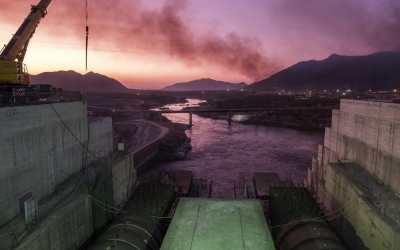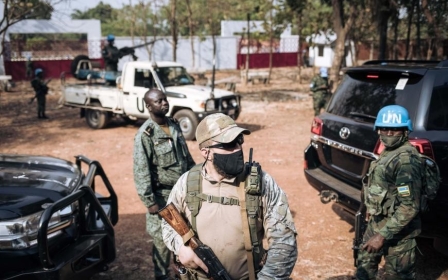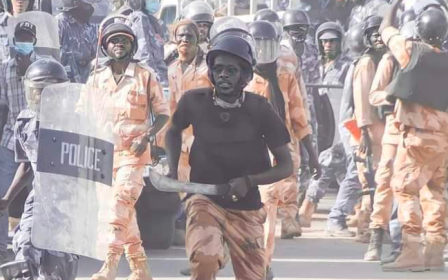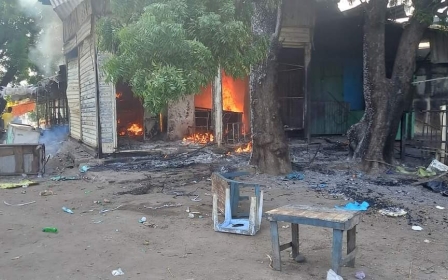Sudan: Blue Nile death toll rises as tribal violence partly blamed on 'elites'
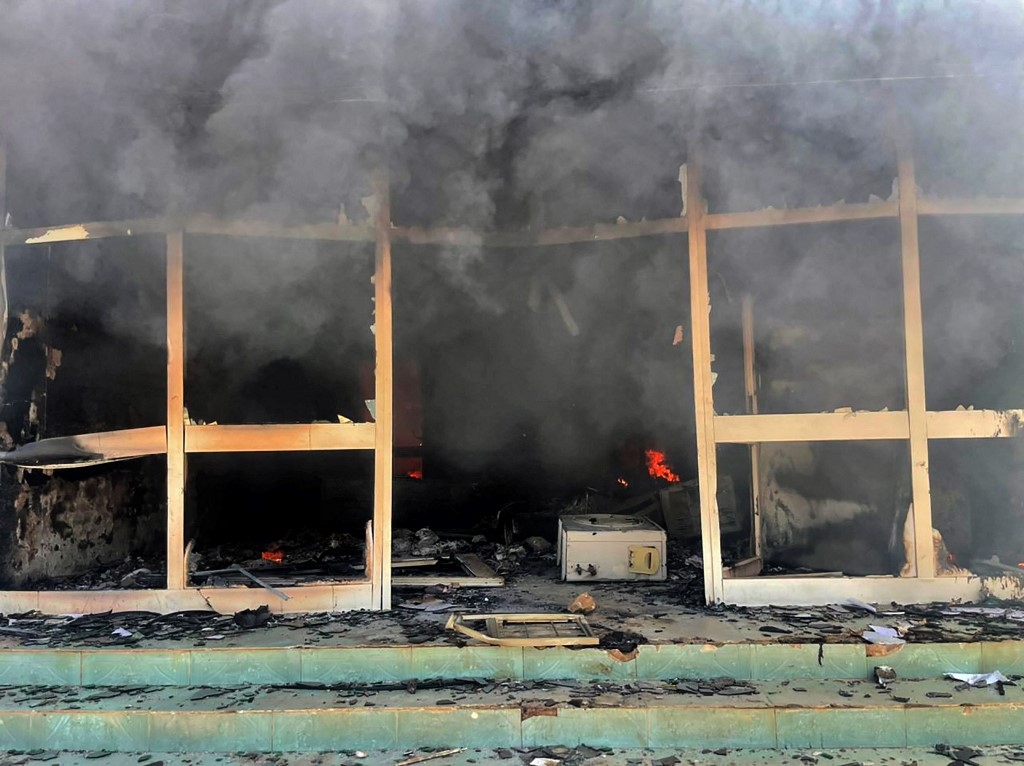
Scores of people have died in the last few days in Sudan’s Blue Nile state, as tribal clashes rage across the region.
Senior health authorities say the fighting has left at least 65 people dead, but medical sources said the real figure was larger and still increasing.
The bulk of the fighting, Middle East Eye understands, has been between the Hausa and al-Hamaj groups.
In the eastern city of Kassala, capital of the state of Kassala, the government has banned public gatherings after several thousand Hausa people "set government buildings and shops on fire".
'The clashes and hate speech that fuel these killings are increasing. We see violence everywhere'
- Maaz Abakar, Blue Nile state resident
Both the Hausa and al-Hamaj tribes are black African groups and the fighting was partly motivated by conflicts of land ownership and control, though experts told MEE the Khartoum government was partly to blame.
New MEE newsletter: Jerusalem Dispatch
Sign up to get the latest insights and analysis on Israel-Palestine, alongside Turkey Unpacked and other MEE newsletters
Maaz Abakar, 34, told Middle East Eye that his father had been killed by an unknown armed group in their village, Genais East.
“The situation in our village has been very tense since Wednesday,” Abakar said over the phone.
“There were clashes in nearby Bakuri village, then they came to Genais East on Thursday. One of our neighbours attacked our house with a gun, killing my father and injuring one of my brothers.”
Abakar said that he could not tell MEE who the killer was because he did not want to ignite the situation. “I can say that the killing was ethnically based, though,” he said.
“The clashes and hate speech that fuel these killings are increasing. We see violence everywhere. What we saw is brutal and ongoing, but there is no serious intervention from the local government,” Abakar said.
Authorities said that 31 people were killed on Friday alone in Blue Nile state, which borders South Sudan and Ethiopia. Medical sources said the figure was actually over 70, as the entire region faces an unprecedented security and humanitarian crisis.
This widespread chaos is unusual in Blue Nile, which is considered relatively calm compared to other parts of Sudan, particularly since the uprising following the ousting of former autocrat Omar al-Bashir in 2019.
An escalation of violence
The clashes began in Blue Nile’s Bakuri village on Wednesday when a farmer from al-Hamaj, one of the oldest African tribes in the region and one that fought with the former Sudan People’s Liberation Movement/North (SPLM-N) against Bashir’s forces, was killed by unknown armed men.
Sources from the two tribes told MEE the violence spread rapidly from Bakuri to Genais East and then on to other parts of the state, including Amura, Um Darfa and Al-Rosairis and Al-Damazin, where the bloodshed reached its peak on Friday.
The fighting between the two sides continued on Sunday in Al-Damazin city, despite the ongoing state of emergency and curfew declared by authorities on Friday night.
'The elites - including politicians and tribal leaders - are behind this violence'
- Sudanese political analyst
Maaz Abakar, who is currently displaced to a school inside Al-Damazin, said that thousands of people had fled to the city from surrounding villages.
“We fled our area of Genais East and moved towards Al-Damazin. Currently, there are thousands of displaced people in the schools and other government buildings,” he said.
“I saw with my own eyes no fewer than 30 dead bodies, and in Allaouta village near Al-Damazin, there are more than 70 people killed and some bodies are still left there, in the streets of the village,” Abakar told MEE.
The Blue Nile resident said he thought there was a “big conspiracy”, as “we saw the police and the army in official uniforms participating in street fighting”.
Sudan’s government, led by the general Abdel Fattah al-Burhan, deployed the military and Rapid Support Forces (RSF) militia to the region in response to the fighting.
Abakar said that tribal fighters in Al-Rosairis had looted weapons from one of the national army’s stores.
Issa Abdul Gadir Haroun, a 37-year-old from the Hausa tribe, told MEE over the phone that the fighting had continued on Sunday between Al-Hamaj forces and an alliance of Hausa and Falata fighters.
“In Al-Hijra, between Al-Damazin and Al-Rosairsis, I saw some armed men slaughtering someone in front of my eyes. They took him down from his car and slaughtered him. They can’t do all this unless they have the support of the government,” Haroun said.
Abu Algasim Ahmed, who is from al-Hamaj tribe and works as a trader in the main market of Al-Rosairis, lost his shop of mobile phones and other small devices after it was burned down by militiamen who attacked the market on Friday afternoon.
Ahmed, 35, believes that he was targeted by the militias and that the lotting and killing was ethnically motivated.
Over 11,000 people displaced
The humanitarian situation in the region has deteriorated as thousands of people left their homes. Ambulances can’t reach hospitals and the entire state is about to run out of medicine, medical sources told MEE.
The source added that hospitals have been attacked by unknown armed men, while some ambulances carrying injured civilians have been blocked from reaching hospitals.
Human rights defender Abdul Alaal Mohamed Abakar said the death toll had increased to more than 100 civilians from both tribes as the authorities don’t want to take responsibility for the protection of civilians.
The lawyer, who leads the local Humanitarian Organisation for Legal Aid, told MEE there are more than 11,000 displaced people inside the state and that others have fled outside the state, walking across the borders of the Blue Nile.
“What we saw were real atrocities in front of the eyes of the authorities, which can’t do anything. I can tell you that the situation is out of the government's control in this state,” he said.
“We call upon international organisations to intervene in order to protect the people, as nobody here trusts the government. Food and health assistance is needed and the situation is deteriorating rapidly.”
A leading member from the Falata tribe, the cousins of the Hausa, said that their houses in Al-Rosairsis and other villages had been attacked.
The SPLM-N Agar faction, which is the ruling party of the state, has denied any involvement in the attacks or in arming the tribes, accusing the former Islamist regime of standing behind the conflict in order to destabilise the situation in the region.
“We documented much evidence proving that the militias of the former ruling party, including the so-called Popular Defence Forces (PDF), were involved in these tribal clashes,” SPLM-N said in a statement.
Elite involvement
A political analyst, who preferred not to be named for security reasons, said the current fighting could be attributed to many political and social causes, adding that hate speech is being widely used to whip up conflict.
“The Juba peace agreement (2020), which doesn’t address the root causes in the state and in the war zones in Sudan in general, is one of the main reasons, but the associates of the old regime are also fueling this conflict, as they appear to be in other areas,” the analyst said.
“Unless the different sides - especially the military regime - stop using the native and tribal leaders for their political campaigns in order to confront the pro-democracy protesters, those tribal leaders will continue their competition and the clashes will spread from one place to another,” they said.
“This is actually a new kind of xenophobic clash - to see it between African tribes in the region… Tribal leaders are using traditional land ownership disputes to put people on their side… The elites - including politicians and tribal leaders - are behind this violence. Without comprehensive political change in Sudan these meaningless mass deaths won’t stop.”
Sudan has for many decades witnessed consecutive civil wars between the Khartoum government, backed by Arab tribes, and rebel movements backed by African tribes.
This situation has led to a series of atrocities, including the genocide in Darfur following the counter-insurgency campaign launched by the administration of Bashir.
This article is available in French on Middle East Eye French edition.
Middle East Eye delivers independent and unrivalled coverage and analysis of the Middle East, North Africa and beyond. To learn more about republishing this content and the associated fees, please fill out this form. More about MEE can be found here.


